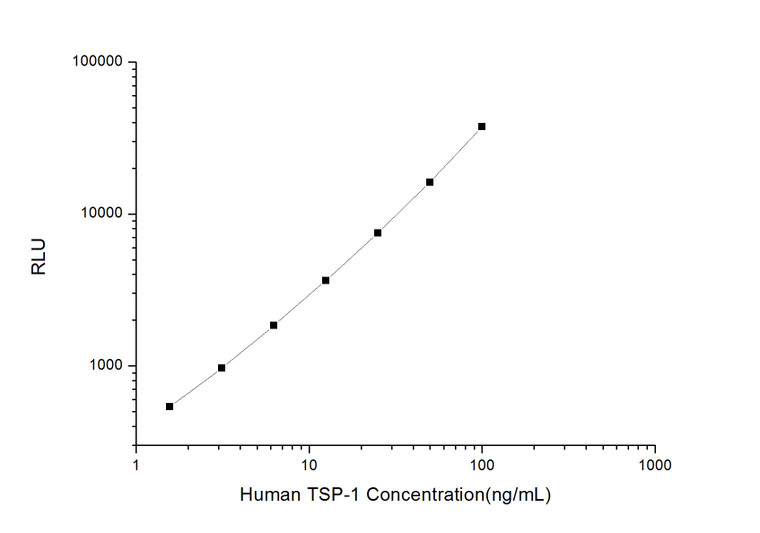| Applications: | CLIA |
| Reactivity: | Human |
| Note: | FOR SCIENTIFIC EDUCATIONAL RESEARCH USE ONLY (RUO). MUST NOT BE USED IN DIAGNOSTIC OR OTHER MEDICAL APPLICATIONS. |
| Sensitivity: | 0.94ng/mL |
| Detection Limit: | 1.56~100ng/mL |
| Short Description: | This human THBS1 kit is a highly sensitive in-vitro chemiluminescent immunoassay for the measurement of trace amounts of analytes. |
| Storage Instruction: | If unopened the kit may be stored at 2-8°C for up to 1 month. If the kit will not be used within 1 month, store the components separately, according to the component table in the manual. |
| Assay Time: | 3.5h |
| Detection: | Chemiluminescence |
| Gene Symbol: | THBS1 |
| Gene ID: | 7057 |
| Uniprot ID: | TSP1_HUMAN |
| Specificity: | This kit recognizes Human TSP-1 in samples. No significant cross-reactivity or interference between Human TSP-1 and analogues was observed. |
| Sample Type: | Serum, plasma and other biological fluids |
| Tissue Specificity | Expressed by platelets (at protein level). Expressed by monocyte-derived immature and mature dendritic cells (at protein level). |
| Function | Adhesive glycoprotein that mediates cell-to-cell and cell-to-matrix interactions. Multifunctional, involved in inflammation, angiogenesis, wound healing, reactive oxygen species (ROS) signaling, nitrous oxide (NO) signaling, apoptosis, senescence, aging, cellular self-renewal, stemness, and cardiovascular and metabolic homeostasis. Negatively modulates dendritic cell activation and cytokine release, as part of an autocrine feedback loop, contributing to the resolution of inflammation and immune homeostasis. Ligand for receptor CD47. Modulates nitrous oxide (NO) signaling via CD47, hence playing a role as a pressor agent, supporting blood pressure. Plays a role in endothelial cell senescence, acting via CD47, by increasing the abundance and activation of NADPH oxidase NOX1, and so generating excess ROS. Inhibits stem cell self-renewal, acting via CD47 signaling, probably by regulation of the stem cell transcription factors POU5F1/OCT4, SOX2, MYC/c-Myc and KLF4. Negatively modulates wound healing, acting via CD47. Ligand for receptor CD36. Involved in inducing apoptosis in podocytes in response to elevated free fatty acids, acting via CD36. Plays a role in suppressing angiogenesis, acting, depending on context, via CD36 or CD47. Promotes cellular senescence in a TP53-CDKN1A-RB1 signaling-dependent manner. Ligand for immunoglobulin-like cell surface receptor SIRPA. Involved in ROS signaling in non-phagocytic cells, stimulating NADPH oxidase-derived ROS production, acting via interaction with SIRPA. Plays a role in metabolic dysfunction in diet-induced obesity, perhaps acting by exacerbating adipose inflammatory activity.its effects may be mediated, at least in part, through enhanced adipocyte proliferation. Plays a role in ER stress response, via its interaction with the activating transcription factor 6 alpha (ATF6) which produces adaptive ER stress response factors. May be involved in age-related conditions, including metabolic dysregulation, during normal aging. |
| Protein Name | Thrombospondin-1Glycoprotein G |
| Database Links | Reactome: R-HSA-114608Reactome: R-HSA-186797Reactome: R-HSA-216083Reactome: R-HSA-3000170Reactome: R-HSA-5083635Reactome: R-HSA-5173214Reactome: R-HSA-8936459 |
| Cellular Localisation | SecretedCell SurfaceExtracellular SpaceExtracellular MatrixEndoplasmic ReticulumSarcoplasmic ReticulumSecreted By Thrombin-Activated Platelets And Binds To The Cell Surface In The Presence Of Extracellular Ca(2+)Incorporated Into The Extracellular Matrix (Ecm) Of FibroblastsThe C-Terminal Region In Trimeric Form Is Required For Retention In The EcmAlso Detected In The Endoplasmic Reticulum And Sarcoplasmic Reticulum Where It Plays A Role In The Er Stress Response |
| Alternative CLIA Names | Thrombospondin-1 CLIA kitGlycoprotein G CLIA kitTHBS1 CLIA kitTSP CLIA kitTSP1 CLIA kit |
| Specificity | This kit recognizes Human TSP-1 in samples. No significant cross-reactivity or interference between Human TSP-1 and analogues was observed. |
| Reproducibility | Both intra-CV and inter-CV are |
Information sourced from Uniprot.org
| Item | Specifications | Storage |
|---|---|---|
| Micro CLIA Plate (Dismountable) | 96T: 8 wells ×12 strips strips | -20℃, 6 months |
| Reference Standard | 96T: 2 vials 48T: 1 vial | -20℃, 6 months |
| Concentrated Biotinylated Detection Ab (100×) | 96T: 1 vial, 120 μL 60 μL | -20℃, 6 months |
| Concentrated HRP Conjugate (100×) | 96T: 1 vial, 120 μL 60 μL | -20℃ (Protect from light), 6 months |
| Reference Standard & Sample Diluent | 1 vial, 20 mL | 2-8°C, 6 months |
| Biotinylated Detection Ab Diluent | 1 vial, 14 mL | 2-8°C, 6 months |
| HRP Conjugate Diluent | 1 vial, 14 mL | 2-8°C, 6 months |
| Concentrated Wash Buffer (25×) | 1 vial, 30 mL | 2-8°C, 6 months |
| Substrate Reagent A | 1 vial, 5 mL | 2-8℃ (Protect from light) |
| Substrate Reagent B | 1 vial, 5 mL | 2-8℃ (Protect from light) |
| Plate Sealer | 5 pieces | |
| Manual | 1 copy | |
| Certificate of Analysis | 1 copy |
| Sample Type | Range (%) | Average Recovery (%) |
|---|---|---|
| Serum(n=8) | 95-110 | 101 |
| EDTA plasma(n=8) | 87-99 | 94 |
| Cell culture media(n=8) | 101-116 | 106 |
| Intra-assay Precision | Intra-assay Precision | Intra-assay Precision | Inter-assay Precision | Inter-assay Precision | Inter-assay Precision | |
|---|---|---|---|---|---|---|
| Sample | 1.00 | 2.00 | 3.00 | 1.00 | 2.00 | 3.00 |
| n | 20.00 | 20.00 | 20.00 | 20.00 | 20.00 | 20.00 |
| Mean (ng/mL) | 4.67 | 13.66 | 42.30 | 4.94 | 14.33 | 44.48 |
| Standard deviation | 0.50 | 1.29 | 4.46 | 0.54 | 1.10 | 3.17 |
| CV (%) | 10.71 | 9.44 | 10.54 | 10.93 | 7.68 | 7.13 |
12 months for antibodies. 6 months for ELISA Kits. Please see website T&Cs for further guidance







